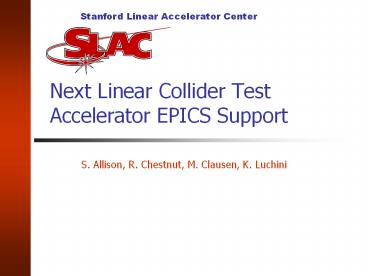Next Linear Collider Test Accelerator EPICS Support - PowerPoint PPT Presentation
Title:
Next Linear Collider Test Accelerator EPICS Support
Description:
DM, MEDM, DM2K, StripTool and Matlab screens served by different hosts onto the same head. ... Results are pivotal for the NLC cotillion at Snowmass ... – PowerPoint PPT presentation
Number of Views:30
Avg rating:3.0/5.0
Title: Next Linear Collider Test Accelerator EPICS Support
1
Next Linear Collider Test Accelerator EPICS
Support
- S. Allison, R. Chestnut, M. Clausen, K. Luchini
2
Our Problem
- DM, MEDM, DM2K, StripTool and Matlab screens
served by different hosts onto the same head. - VMS and Unix/Legacy system and Epics in the mix.
- Need to manage host processes AND displays on
single heads.
3
Next Linear Collider Test Accelerator and EPICS
- PSI Epics Meeting
- May, 2001
- S. Allison, R. Chestnut, M. Clausen, K. Luchini
4
Current NLCTA Controls
- Originally an EPICS target
- Mixture of SLC, Labview, VeetestSlow (1/2 Hertz
control) - Two structures with two klystrons each
- Process structures to show feasibility/durabilit
y for NLC - Desire to run without operators present
5
Whats the big deal?
- Structures are critical for NLC design
- Results are pivotal for the NLC cotillion at
Snowmass - Current intense involvement by a diagnostics
group SWAT team - Current intense scrutiny by management
6
NLCTA RF Processing Layout
Drive 1
Sled
Klys Out
RE1 FE1
Drive 2
RE2 FE2
Load2
Load1
These measurement points correspond to
thevariables mentioned in the briefing. These
are in Joules, and are the integral over the RF
pulse.
7
The move to EPICS
- Slow IOC (MV177)
- Alan Bradley
- VSAM
- Fast IOC (MVME 2700)
- ADC signals
- TDC signals
- DAC control
- Digital I/O
8
Slow IOC
- Alan Bradley interface to move from Veetest to
Epics - Prying details from PLC programmers
- Lots of signals the devil is in the details
- Work well under way, with many details remaining
9
Fast IOC
- 60 (or 120 Hz) operation
- New (for us) integrating ADC, TDC, DAC and
digital I/O support - New (for us) Power PC
- Requirements specify pulse by pulse monitor and
control of structure processing
10
Fast IOC Hardware
- MVME 2700 Power PC
- Caen V265 Gated ADC (3)
- Lecroy 1176 TDC
- VMIC 2534 32-bit Digital I/O
- VMIC 4100 12-bit D/A
- Joerger VTR812 12-bit digitizer (later)
11
Fast IOC fast loop
- Read in 20 ADC signals and 6 TDC signals
- Perform limit checks on various power
measurements - Disable on one felony OR two parole violations in
quick succession - Provide ring buffers for off-line analysis
- All of the above synchronized on each pulse
12
Fast ADC and PIOP records
- One ADC interrupts other records fired by
events whole fast loop is one lockset. - One ADC record for each module
- Quadratic conversion per channel
- Circular buffers built in
13
Fast ADC Record
120 Hz
8 HW Inputs
Per Channel Signal in Joules N-sec circ. buffer
FE1
Load1
8x3 conversion coefficients
14
Fast ADC and PIOP records
- One PIOP record per structure not 1-to-1 with
ADC records. - PIOP record has 20 or so db links to hard-coded
PVs. - One ADC and one PIOP at 60 Hz take 6 of the
MV177 - Seems to take about .0016 seconds per loop.
15
PIOP subroutine record
120 Hz
Functioning Calculate NORM, LOST Check for
warning/error Drive GO/NOGO digital output
Inputs 9( or maybe12) converted ADC signals
limits
16
Fast IOC asynchronous fast code
- Implement re-enabling strategies for different
failure modes - Watch vacuums and other relevant data
- Can also trip off on vacuum
- All of the above fast, but asynchronous to the
pulse-by-pulse flow
17
Next Milestones
- May 7 have local testing done ready to move
equipment down to NLCTA. - May 15 next run starts be ready to run
parasitically - June 29 Current structures at end of life
Snowmass cut over to Epics as primary system.
18
The other 20
- Displays (many)
- Infrastructure (save/restore, archiver, configs,
CUDs, StripTool, SIP, SCP support, alarm logging) - Testing modules, drivers, and fast, synchronous
software - Matlab support (offline event analysis)
19
The really big deal
- Data storage for archiving(Network layout,
computer center role, etc.) - Faster machines (additional load!)
- NLCTA could keep a fast Sun busy AND fill any
space we can give them.































